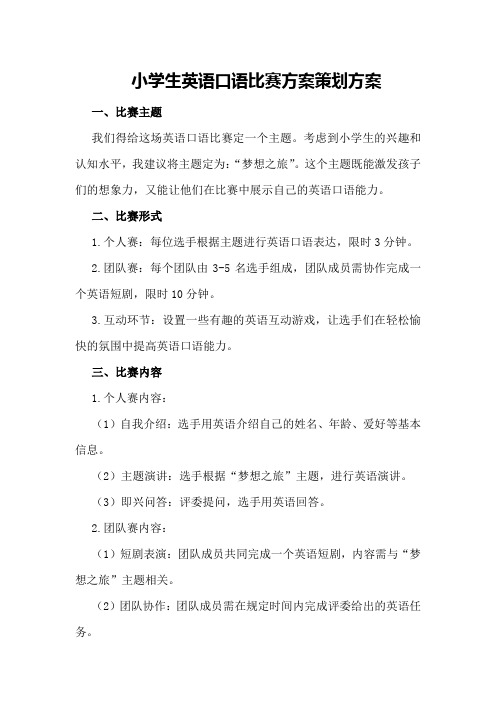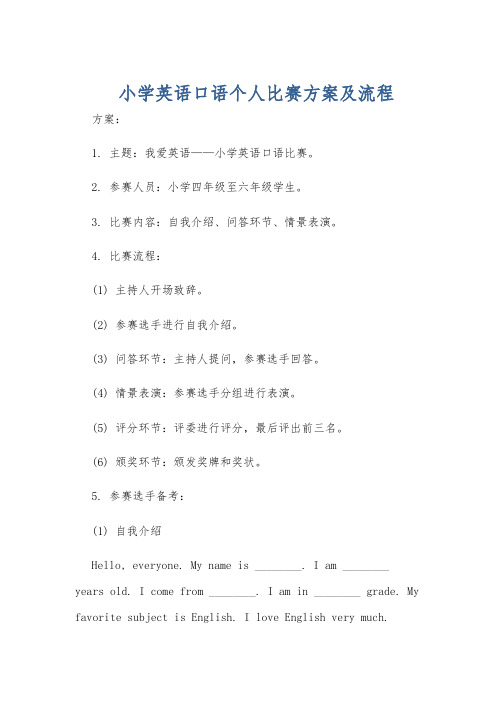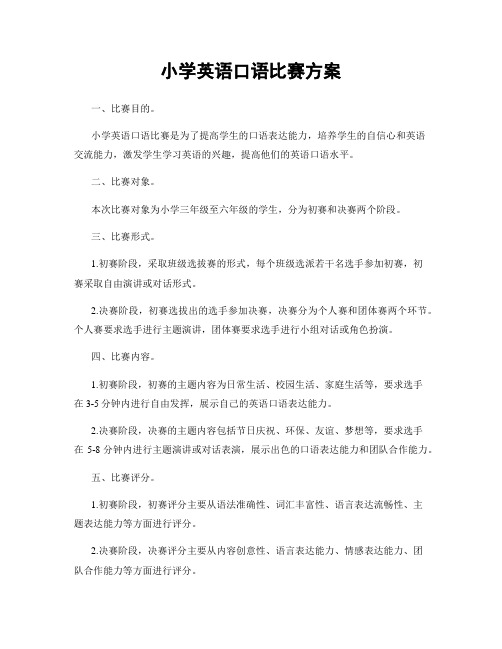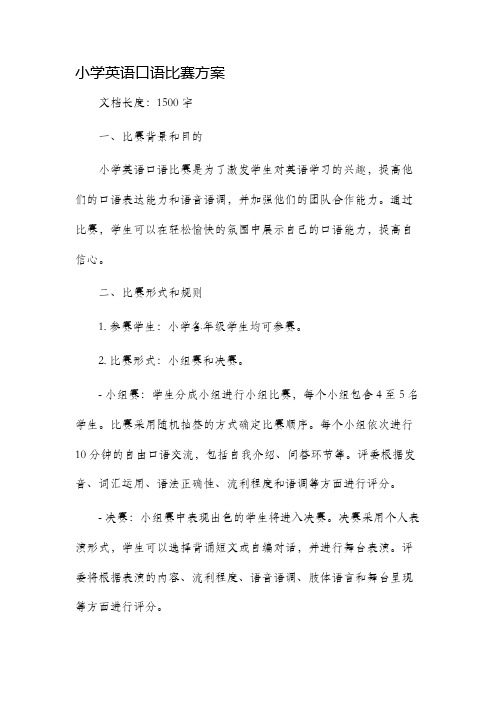小学英语口语大赛方案
小学生英语口语比赛方案策划方案

小学生英语口语比赛方案策划方案一、比赛主题我们得给这场英语口语比赛定一个主题。
考虑到小学生的兴趣和认知水平,我建议将主题定为:“梦想之旅”。
这个主题既能激发孩子们的想象力,又能让他们在比赛中展示自己的英语口语能力。
二、比赛形式1.个人赛:每位选手根据主题进行英语口语表达,限时3分钟。
2.团队赛:每个团队由3-5名选手组成,团队成员需协作完成一个英语短剧,限时10分钟。
3.互动环节:设置一些有趣的英语互动游戏,让选手们在轻松愉快的氛围中提高英语口语能力。
三、比赛内容1.个人赛内容:(1)自我介绍:选手用英语介绍自己的姓名、年龄、爱好等基本信息。
(2)主题演讲:选手根据“梦想之旅”主题,进行英语演讲。
(3)即兴问答:评委提问,选手用英语回答。
2.团队赛内容:(1)短剧表演:团队成员共同完成一个英语短剧,内容需与“梦想之旅”主题相关。
(2)团队协作:团队成员需在规定时间内完成评委给出的英语任务。
四、比赛流程1.报名阶段:各学校组织报名,选拔优秀选手参加比赛。
2.初赛阶段:选手按照比赛内容进行个人赛和团队赛,评委评分,选拔晋级选手。
3.复赛阶段:晋级选手再次进行个人赛和团队赛,评委评分,选拔决赛选手。
4.决赛阶段:决赛选手进行个人赛和团队赛,评委评分,评选出一、二、三等奖及优秀奖。
五、评委与评分标准1.评委:邀请英语专业教师、外籍教师担任评委,保证比赛的公平、公正、公开。
2.评分标准:(1)发音标准:选手的发音需清晰、准确。
(2)语言流畅:选手在表达过程中,语言要流畅,无停顿。
(3)内容丰富:选手的表达内容需充实、有创意。
(4)表情、动作:选手在表达过程中,表情、动作要自然、生动。
六、奖励措施1.获奖选手将获得证书、奖品及丰厚奖学金。
2.优秀组织奖:评选出组织工作出色的学校,颁发荣誉证书。
3.优秀指导教师奖:评选出指导选手取得优异成绩的教师,颁发荣誉证书。
4.优秀志愿者奖:评选出在比赛中表现突出的志愿者,颁发荣誉证书。
小学英语口语个人比赛方案及流程

小学英语口语个人比赛方案及流程方案:1. 主题:我爱英语——小学英语口语比赛。
2. 参赛人员:小学四年级至六年级学生。
3. 比赛内容:自我介绍、问答环节、情景表演。
4. 比赛流程:(1) 主持人开场致辞。
(2) 参赛选手进行自我介绍。
(3) 问答环节:主持人提问,参赛选手回答。
(4) 情景表演:参赛选手分组进行表演。
(5) 评分环节:评委进行评分,最后评出前三名。
(6) 颁奖环节:颁发奖牌和奖状。
5. 参赛选手备考:(1) 自我介绍Hello, everyone. My name is ________. I am ________ years old. I come from ________. I am in ________ grade. My favorite subject is English. I love English very much.大家好,我叫________。
我今年________岁。
我来自________。
我在________年级。
我最喜欢的科目是英语。
我非常喜欢英语。
(2) 问答环节Q: What is your favorite color?A: My favorite color is ________.问题:你最喜欢的颜色是什么?回答:我最喜欢的颜色是________。
Q: What do you like to do in your free time?A: I like to ________.问题:你在空闲的时间喜欢做什么?回答:我喜欢________。
(3) 情景表演参赛选手可以结合自己的兴趣爱好和生活经验,自由发挥,进行情景表演。
6. 评分标准:(1) 自我介绍:语言表达、内容完整度。
(2) 问答环节:回答准确度、语言流利度。
(3) 情景表演:表演技巧、语言流利度、情感表达。
7. 奖项设置:(1) 一等奖:奖牌、奖状、精美礼品。
(2) 二等奖:奖牌、奖状、精美礼品。
小学英语口语比赛方案

小学英语口语比赛方案一、比赛目的。
小学英语口语比赛是为了提高学生的口语表达能力,培养学生的自信心和英语交流能力,激发学生学习英语的兴趣,提高他们的英语口语水平。
二、比赛对象。
本次比赛对象为小学三年级至六年级的学生,分为初赛和决赛两个阶段。
三、比赛形式。
1.初赛阶段,采取班级选拔赛的形式,每个班级选派若干名选手参加初赛,初赛采取自由演讲或对话形式。
2.决赛阶段,初赛选拔出的选手参加决赛,决赛分为个人赛和团体赛两个环节。
个人赛要求选手进行主题演讲,团体赛要求选手进行小组对话或角色扮演。
四、比赛内容。
1.初赛阶段,初赛的主题内容为日常生活、校园生活、家庭生活等,要求选手在3-5分钟内进行自由发挥,展示自己的英语口语表达能力。
2.决赛阶段,决赛的主题内容包括节日庆祝、环保、友谊、梦想等,要求选手在5-8分钟内进行主题演讲或对话表演,展示出色的口语表达能力和团队合作能力。
五、比赛评分。
1.初赛阶段,初赛评分主要从语法准确性、词汇丰富性、语言表达流畅性、主题表达能力等方面进行评分。
2.决赛阶段,决赛评分主要从内容创意性、语言表达能力、情感表达能力、团队合作能力等方面进行评分。
六、奖励措施。
对初赛和决赛的优胜者进行表彰和奖励,鼓励他们在英语口语学习方面取得更好的成绩。
同时,对所有参与比赛的学生进行鼓励和肯定,激发他们学习英语的热情。
七、活动意义。
通过举办英语口语比赛,可以有效提高学生的口语表达能力,激发学生学习英语的兴趣,促进学生之间的交流和合作,为学生的英语学习打下良好的基础,提高他们的综合素质。
八、总结。
小学英语口语比赛是一项有益的活动,能够有效提高学生的口语表达能力和英语学习兴趣,是学校英语教育工作的一项重要内容。
希望通过比赛,能够激发更多学生对英语学习的热情,提高他们的口语表达能力,为将来的英语学习打下坚实的基础。
小学口语大赛实施方案

小学口语大赛实施方案一、赛事背景。
小学口语大赛是为了激发学生学习英语的兴趣,提高他们的口语表达能力而举办的比赛。
通过比赛,可以让学生在轻松愉快的氛围中展示自己的口语能力,增强他们对英语学习的自信心,促进英语教学的深入开展。
二、比赛对象。
本次口语大赛面向全校小学生开放,分为小学一年级至小学六年级不同年级的组别,每个年级分别设置初赛、复赛和决赛,以确保比赛的公平公正。
三、比赛形式。
1. 初赛,初赛采用朗读和自由发挥相结合的形式,学生可以根据自己的兴趣选择课文朗读或自编口语节目进行表演,每位选手有3分钟的时间进行表演。
2. 复赛,复赛为问答环节,学生需就指定话题进行口语表达和回答问题,展示自己的语言组织能力和逻辑思维能力。
3. 决赛,决赛将由评委提供题目,学生需现场即兴发挥,进行口语表达和辩论,以展示自己的口语应变能力和语言表达能力。
四、比赛评分。
评委将根据学生的发音、语调、语速、表情、语言组织能力、逻辑思维能力等方面进行评分。
评分标准将根据不同年级和不同比赛环节进行调整,以确保评分公正合理。
五、奖项设置。
本次口语大赛将设置一、二、三等奖及优秀奖,每个年级将评选出相应数量的获奖选手,并对他们进行奖励和表彰。
六、比赛时间和地点。
口语大赛将于每学期末举行,具体时间和地点将根据学校实际情况另行通知。
七、组织保障。
为了保证比赛的顺利进行,学校将成立口语大赛组织委员会,负责具体的组织工作。
同时,学校将安排专业的英语教师担任评委,以确保比赛的公正公平。
八、宣传推广。
学校将通过校园广播、班级通知、家长会等多种形式进行口语大赛的宣传推广,鼓励更多的学生积极参与,共同感受英语学习的乐趣。
九、总结。
口语大赛是学校英语教学工作的一项重要活动,通过比赛的举办,可以有效提高学生的口语表达能力,激发他们学习英语的兴趣,为英语教学工作注入新的活力。
希望全体学生积极参与,共同努力,为口语大赛的成功举办贡献自己的力量。
小学英语口语个人比赛方案及流程

小学英语口语个人比赛方案及流程全文共3篇示例,供读者参考篇1Elementary English Oral Competition Scheme and ProcessIntroduction:The Elementary English Oral Competition is designed to improve students' English speaking abilities and build their confidence in using the language. This event provides students with a platform to showcase their language skills and creativity through various speaking activities.Scheme:1. Eligibility:- The competition is open to all elementary school students from grades 1 to 6.- Students can participate individually or in pairs.2. Competition Categories:- Poetry Recitation: Students will recite a poem of their choice.- Storytelling: Students will tell a story based on a given theme or book.- Role-Playing: Students will act out a given scenario or dialogue.- Speech Presentation: Students will deliver a speech on a topic of their choice.3. Preparation:- Students should practice regularly and memorize their content.- Students can seek help from teachers, parents, or peers for feedback and guidance.- Students should focus on pronunciation, intonation, and fluency in their speeches.4. Evaluation Criteria:- Pronunciation and Intonation: Clear pronunciation and appropriate intonation.- Fluency: Smooth and continuous delivery of speech.- Content: Relevance to the topic, creativity, and originality.- Confidence: Poise, self-assurance, and engagement with the audience.Process:1. Registration:- Students interested in participating in the competition must register with the school coordinator.- Registration forms will be provided with details of the competition categories and guidelines.2. Selection:- Each class will conduct preliminary rounds to select the finalists for the school competition.- Judges will evaluate students based on the criteria mentioned above and select the top performers.3. Rehearsal:- Finalists will have the opportunity to rehearse their speeches with teachers or mentors.- Students can make any necessary changes or improvements to their presentations.4. School Competition:- The school competition will be held in the auditorium or school hall.- Students will perform one by one in front of judges, teachers, and classmates.- Winners will be announced based on the judges' scores and audience response.5. Awards Ceremony:- The winners will receive certificates, medals, or trophies in recognition of their achievement.- Participants will be encouraged and praised for their efforts and dedication.Conclusion:The Elementary English Oral Competition is a valuable opportunity for students to showcase their language skills and creativity. Through this event, students can improve their English speaking abilities, build confidence, and develop a love for the language. The competition scheme and process provide a structured and engaging platform for students to express themselves and shine.篇2Title: Primary School English Oral Competition Plan and ProcessIntroduction:The primary school English oral competition is a great platform for students to showcase their language skills and boost their confidence in speaking English. The competition not only helps improve students' language proficiency but also promotes public speaking and communication skills.Plan:1. Formation of Competitors: Throughout the school year, teachers can identify and select students with strong English speaking abilities to participate in the competition. It is crucial to provide training and guidance to prepare the competitors for the competition.2. Selection of Topics: The competition can consist of various categories such as solo speeches, dialogues, storytelling, and recitations. Topics can be chosen based on the students' interests and proficiency levels. Competitors can be given the freedom to select their preferred topics or assigned specific topics by the organizing committee.3. Preparation of Speeches: Competitors should be encouraged to write and practice their speeches well in advance. They can seek guidance from teachers, practice in front of a mirror, or record themselves to improve their delivery and pronunciation.4. Rehearsals: It is essential to conduct rehearsals to provide feedback and fine-tune the speeches. Teachers and peers can offer constructive criticism to help competitors enhance their presentation skills.5. Judging Criteria: A panel of judges comprising English teachers and language experts can evaluate the competitors based on criteria such as pronunciation, fluency, content, creativity, and confidence. Clear guidelines should be provided to ensure fairness in the judging process.Process:1. Opening Ceremony: The competition can begin with an opening ceremony where the rules and format of the competition are explained. Competitors can also be introduced and welcomed on stage.2. Individual Speeches: Competitors will take turns to deliver their speeches in front of the audience and judges. Each speechshould be within a specified time limit to ensure a smooth flow of the competition.3. Q&A Session: Judges can ask questions related to the speech topics to test the competitors' comprehension and ability to think on their feet. This session can add an interactive element to the competition.4. Award Presentation: After all the competitors have performed, the judges can deliberate and announce the winners based on their scores. Prizes and certificates can be awarded to recognize the top performers.5. Closing Ceremony: The competition concludes with a closing ceremony where participants, teachers, and supporters can celebrate the successful completion of the event. Feedback and suggestions for improvement can also be shared for future competitions.Conclusion:The primary school English oral competition is a valuable opportunity for students to develop their English language skills and boost their confidence in speaking English. With proper planning, organization, and support, the competition can be a rewarding experience for both competitors and spectators. It isessential to create a conducive environment that encourages students to showcase their talents and foster a love for the English language.篇3Elementary English Oral Competition Plan and ProcessAs students continue to develop their English language skills, oral competitions play a crucial role in testing their speaking abilities and boosting their confidence. Organizing a personal English oral competition for elementary school students can be a fun and engaging way to encourage participation and improve language proficiency. In this article, we will outline a comprehensive plan and process for conducting a successful elementary English oral competition.1. Objective:The primary objective of the English oral competition is to provide students with a platform to showcase their speaking skills and creativity while building confidence in using the English language. Through this competition, students will be able to enhance their pronunciation, vocabulary, and fluency, ultimately improving their overall English communication skills.2. Competition Format:The competition can be divided into three rounds:a. Preliminary Round: In this round, all participating students will be required to prepare and present a 1-2 minute speech on a given topic. Judges will evaluate each student based on their pronunciation, fluency, vocabulary, and overall presentation skills.b. Semi-Final Round: The top performers from the preliminary round will advance to the semi-final round, where they will participate in a role-playing activity or a dialogue with a partner. This round will test students' ability to engage in a conversation in English and showcase their interactive skills.c. Final Round: The finalists will compete in a debate or impromptu speaking activity, where they will be required to express their opinions on a given topic or respond to a question on the spot. This round will challenge students to think critically and articulate their thoughts clearly and confidently.3. Judging Criteria:Judges will evaluate participants based on the following criteria:a. Pronunciation: Clear and accurate pronunciation of words and phrases.b. Fluency: Smooth and natural flow of speech with minimal pauses and hesitations.c. Vocabulary: Effective use of a wide range of vocabulary to express ideas and opinions.d. Presentation Skills: Engaging and confident delivery, including eye contact, gestures, and body language.4. Preparation:To prepare for the competition, students should practice speaking English regularly and work on improving their pronunciation, vocabulary, and fluency. They should also rehearse their speeches, role-plays, debates, or impromptu speaking activities with a teacher, parent, or peer to receive feedback and make necessary adjustments.5. Process:The following steps can be followed to organize and conduct the English oral competition:a. Announcement and Registration: Inform students about the competition and invite interested participants to register. Provide them with guidelines, topics, and rules for the competition.b. Selection of Judges: Recruit qualified judges, such as English teachers, language experts, or native English speakers, to evaluate the participants fairly and impartially.c. Preparation of Topics: Develop a list of topics for each round of the competition, ensuring that they areage-appropriate and relevant to the students' interests and experiences.d. Conducting Rounds: Organize and conduct the preliminary, semi-final, and final rounds of the competition, ensuring that each participant has a fair chance to showcase their skills and progress to the next round.e. Award Ceremony: Conclude the competition with an award ceremony to recognize and celebrate the achievements of the participants. Present certificates, medals, or prizes to the winners and runners-up to motivate and encourage their continued efforts in learning English.In conclusion, organizing a personal English oral competition for elementary school students can be a rewarding experience for both participants and organizers. By following the plan and process outlined in this article, teachers and school administrators can create a stimulating and supportiveenvironment for students to develop their speaking skills, gain confidence, and foster a love for the English language.。
小学英语口语比赛方案

小学英语口语比赛方案文档长度:1500字一、比赛背景和目的小学英语口语比赛是为了激发学生对英语学习的兴趣,提高他们的口语表达能力和语音语调,并加强他们的团队合作能力。
通过比赛,学生可以在轻松愉快的氛围中展示自己的口语能力,提高自信心。
二、比赛形式和规则1. 参赛学生:小学各年级学生均可参赛。
2. 比赛形式:小组赛和决赛。
- 小组赛:学生分成小组进行小组比赛,每个小组包含4至5名学生。
比赛采用随机抽签的方式确定比赛顺序。
每个小组依次进行10分钟的自由口语交流,包括自我介绍、问答环节等。
评委根据发音、词汇运用、语法正确性、流利程度和语调等方面进行评分。
- 决赛:小组赛中表现出色的学生将进入决赛。
决赛采用个人表演形式,学生可以选择背诵短文或自编对话,并进行舞台表演。
评委将根据表演的内容、流利程度、语音语调、肢体语言和舞台呈现等方面进行评分。
三、比赛内容和评分标准1. 比赛内容:- 自我介绍:学生在1分钟内进行自我介绍,包括姓名、年级、爱好等方面。
- 问答环节:学生需要回答评委的问题,评委根据问题的难度和学生的回答质量进行评分。
- 背诵短文或自编对话:学生在3至5分钟内进行短文背诵或自编对话,并进行舞台表演。
2. 评分标准:- 发音:准确、清晰、自然。
- 词汇运用:丰富、恰当,使用正确的词汇。
- 语法正确性:正确使用语法规则。
- 流利程度:表达连贯、流畅,没有过多的停顿和重复。
- 语调:自然、得体,注意语调的扬抑和语音的抑扬顿挫。
- 内容准确性:回答问题或表达内容准确无误。
- 手势和肢体语言:适当运用手势和肢体语言,配合口语表达。
- 舞台表演:舞台表演的创意、表现力和才艺展示。
四、比赛准备和推广- 通过学校广播、课堂宣传等方式向全校学生宣传比赛,鼓励学生积极参与。
- 在英语课堂上加强口语训练,指导学生练习自我介绍、问答等对话形式。
- 提供学生背诵短文或编写对话的范文和示范,激发他们的创作热情。
- 安排时间和场地进行小组赛和决赛的准备和举办。
小学英语口语交流比赛活动方案
小学英语口语交流比赛活动方案活动目的本次比赛旨在提高小学生的英语口语能力,培养他们的口语表达能力和自信心,激发研究英语的兴趣。
活动时间活动将于XX年XX月XX日在学校举行,比赛时间为上午9点至下午3点。
比赛形式1. 比赛采取个人赛和团体赛相结合的形式。
2. 个人赛:每位参赛选手将进行自我介绍和简短的英语演讲。
3. 团体赛:每个班级组成一个团队,进行小组对话和情景表演,展示团队合作和沟通能力。
参赛要求1. 参赛选手为小学三年级至五年级的学生。
2. 每个班级可推荐2名学生参加个人赛,每个班级组织1个团队参加团体赛,团队人数不超过5人。
3. 参赛选手需提前进行报名,并经过初赛选拔。
4. 参赛选手需准备自己的演讲稿和团体表演剧本,并经老师审核。
比赛评分标准1. 个人赛评分标准:发音准确、表达流利、语法正确、内容连贯、自信大方。
2. 团体赛评分标准:语言交流、团队合作、表演技巧、创意与主题。
奖项设置1. 个人赛设置一、二、三等奖。
2. 团体赛设置一、二、三等奖。
3. 最佳表现奖:分别在个人赛和团体赛中评选出最佳表现奖项。
活动准备1. 确定比赛场地、时间和设备需求。
2. 宣传活动,鼓励学生报名参赛。
3. 组织老师进行初赛选拔,确定参赛选手。
4. 提前安排比赛流程和评委。
5. 准备比赛所需器材和奖品。
活动宣传1. 制作海报和宣传册,宣传比赛的目的和要求,吸引学生报名参赛。
2. 在学校广播、橱窗、班级通知栏等地方发布宣传信息。
3. 利用学校网站和社交媒体宣传比赛信息,吸引更多人关注。
活动执行1. 按照比赛流程,进行个人赛和团体赛。
2. 根据评委评分,确定获奖选手和团队。
3. 举行颁奖仪式,表彰获奖者,鼓励所有参赛选手。
4. 对比赛进行总结和反思,为今后的活动提供改进建议。
以上是本次小学英语口语交流比赛活动方案,请各位老师和同学们积极参与,共同为活动的成功举行努力!。
小学英语口语竞赛活动方案
小学英语口语竞赛活动方案背景英语口语是培养学生英语交流能力的重要环节。
为了激发小学生对英语口语的兴趣,提高他们的口语表达能力,我们决定举办一场小学英语口语竞赛活动。
目标- 提高学生英语口语表达能力- 培养学生的自信心- 解除学生对英语口语的恐惧感时间与地点- 时间:XX月XX日- 地点:学校礼堂活动准备1. 设计竞赛形式:采用小组竞赛的形式,每个小组由4-5名学生组成。
2. 组织评委:邀请熟练的英语教师和外教担任评委。
3. 准备主题:确定几个适合小学生口语表达的主题,例如家庭、学校生活、节日等。
4. 编写题目:根据主题编写适合小学生的口语题目。
5. 准备奖品:准备一些小奖品,如奖状、小礼物等。
活动流程1. 开幕式:- 主持人介绍活动背景和目标- 学生代表致辞2. 竞赛环节:- 分组比赛,每个小组轮流进行口语表达- 每个小组的成员依次进行表达,时间限制为1-2分钟- 评委根据内容、流利度、语法准确性和发音等方面进行评分3. 奖项颁发:- 根据评委评分确定获奖小组- 颁发奖状和奖品4. 闭幕式:- 主持人总结比赛过程和成果- 学生代表发表感言宣传与参与1. 在学校宣传栏发布活动海报,向学生和家长推广活动。
2. 邀请其他年级的学生观看比赛,增加参与感和研究动力。
3. 鼓励学生积极参与,提前组织练时间。
风险与问题1. 时间不够:确保活动时间的充分安排,避免超时。
2. 紧张情绪:给予学生足够的鼓励和支持,帮助他们度过紧张情绪。
3. 评分不公:确保评委评分标准公正且透明。
结束语本次小学英语口语竞赛活动旨在提高小学生的英语口语表达能力,培养他们的自信心和兴趣。
通过活动的精心准备和组织,我们相信学生们将会在竞赛中展示出自己的才华和能力,收获宝贵的研究经验。
让我们共同期待这场精彩的竞赛!*[LLM]: Legal and Law Master。
小学英语口语比赛方案
小学英语口语比赛方案
小学英语口语比赛方案
一、比赛主题
主题为“我的家乡”。
二、比赛形式
以小组为单位,每组3人,比赛形式为即兴演讲和问答环节。
三、比赛流程
1.开场
主持人介绍比赛形势及规则。
2.即兴演讲环节
每组选手随机抽取家乡相关的题目,准备1分钟后进行即兴演讲,时间限制2~3分钟。
3.问答环节
每组选手由主持人抽取问题,回答时间30秒,每组3个问题。
4.结束语
主持人宣布比赛结果及奖项。
四、比赛评分标准
即兴演讲环节:
1.语言表达能力(20分)
2.内容完整度(20分)
3.口语流利度(20分)
问答环节:
1.回答准确度(20分)
2.语言表达能力(20分)
总分:100分。
五、奖项设置
1.一等奖:每组1名,奖品为小学英语教材套装。
2.二等奖:每组1名,奖品为英语学习工具。
3.三等奖:每组1名,奖品为英语读物。
4.优秀组织奖:1名,评审专家评选。
六、配套措施
1.组织策划人员:校英语教师组织,协助招募及培训选手。
2.比赛评审专家:邀请校外英语专家及校内英语教师。
3.比赛场地设备:提供课件展示设备及音响设备。
4.奖品筹备:由学校财务部门负责购买及颁发。
七、安全保障
1.比赛过程中主持人应注意场地秩序及安全。
2.选手要求着装整齐,场地要求干净整洁。
3.比赛中如发生意外情况,应及时处理及报告。
以上为小学英语口语比赛方案,希望能对您有所帮助。
祝愿比赛圆满成功!。
一年级英语口语比赛活动方案
一、活动目的:通过英语口语比赛,培养一年级学生的英语口语能力,激发学生学习英语的兴趣,提高学生的自信心和表达能力。
二、活动安排:1.活动的时间:根据学校的实际情况安排,建议在课余时间进行,以不影响正常课程的进行。
2.活动的形式:以个人演讲和小组对话的形式开展。
3.参赛学生:由各班级选拔出两名优秀学生参赛。
4.比赛的内容:可以根据学生的年龄和英语水平确定比赛内容,以下是一些可能的内容:(1)个人自我介绍;(2)描述家庭成员和爱好;(3)讲述一段有趣的故事;(4)观看短片并进行简单的对话;(5)讲述一次有趣的经历等。
三、比赛流程:1.准备阶段:(1)各班级老师选拔两名学生参赛,并进行初步的英语口语培训;(2)学校组织一系列的英语口语练习活动,包括角色扮演、对话练习等;(3)学生准备比赛内容,并进行口语训练。
2.比赛阶段:(1)比赛分为个人演讲和小组对话两个环节;(2)个人演讲环节:每个参赛学生准备一段个人演讲,时间不超过两分钟;(3)小组对话环节:每个小组由两名学生组成,学生需在给定的话题上展开对话,时间不超过三分钟;(4)比赛采取积分制,根据表现进行评分,评委包括班主任、英语老师等专业人员。
3.颁奖仪式:(1)比赛结束后,对获奖学生进行表彰,并颁发奖杯和奖状;(2)对其他参赛学生进行鼓励和奖励,提高他们参与活动的积极性。
四、比赛效果评估:1.对参赛学生进行比赛前后的英语口语水平评估,以了解他们的进步情况;2.对学生和家长进行问卷调查,收集意见和建议,以完善活动方案。
五、活动保障:1.学校提供比赛场地和设备,并确保比赛的顺利进行;2.提供资金支持,以购买奖品和比赛所需的教具;3.邀请英语专业教师和语言培训机构的专家进行评委,保证评分的公平性和客观性;4.学校通过家长会、校园宣传等渠道宣传比赛活动,提高学生和家长的参与度。
六、经费预算:1.奖杯和奖状:500元;2.活动宣传:200元;3.其他费用(如礼品等):500元;4.总预算:1200元。
- 1、下载文档前请自行甄别文档内容的完整性,平台不提供额外的编辑、内容补充、找答案等附加服务。
- 2、"仅部分预览"的文档,不可在线预览部分如存在完整性等问题,可反馈申请退款(可完整预览的文档不适用该条件!)。
- 3、如文档侵犯您的权益,请联系客服反馈,我们会尽快为您处理(人工客服工作时间:9:00-18:30)。
附:西北协作区小学生英语口语风采大赛方案(草案)
一、活动目的:
促进学生对英语学科的学习兴趣和自觉性,展示各校英语教学的丰硕成果,展现新世纪小学生朝气蓬勃、奋发向上的精神风貌。
二、活动形式:
四月份为协作区各镇、校组织初赛,五月中上旬在马坪镇中心小学进行决赛。
三、活动要求:
1、各组别设个人和集体(2-5人)两个项目进行比赛。
2、集体项目:设英语歌曲、英语诗朗诵、英语校园剧,英语小品(情景短剧)(集体项目不包含齐声背诵和分别背诵同一内容的文章,时间3—6分钟,可根据剧情的需要合理准备服装,道具,cd音乐)
3、每个镇办选出2个节目参加决赛
比赛内容,评分标准及时间要求:
(1)总体要求:发音清晰,语调自然,语言流畅,语法正确。
贴近生活,表达真情实感,积极向上,有新意,切题,有深度,逻辑性强,条理清楚,有丰富的想象力和感染力。
问答题一定要听懂问题,表达出自己的思想,观点,语言流畅,层次清晰,语法正确。
(2)具体要求:个人项目:根据语音语调,语言技巧,词汇语法,流利程度等几方面。
集体项目:根据剧目内容及难易程度,语音语调,词汇语法,人物之间对话的衔接性,表现力,整个剧目的完整性等几方面。
四、奖项设立:
1、按组别设立集体、个人奖项,分别为一、二等奖。
2、学校设优秀组织奖、优秀指导教师奖。
3、获奖证书待活动结束后,上报教研室,盖教研室章子。
说明:待详细评分细则制定好后发至群里,请各镇办、校根据细则加以指导和训练。
